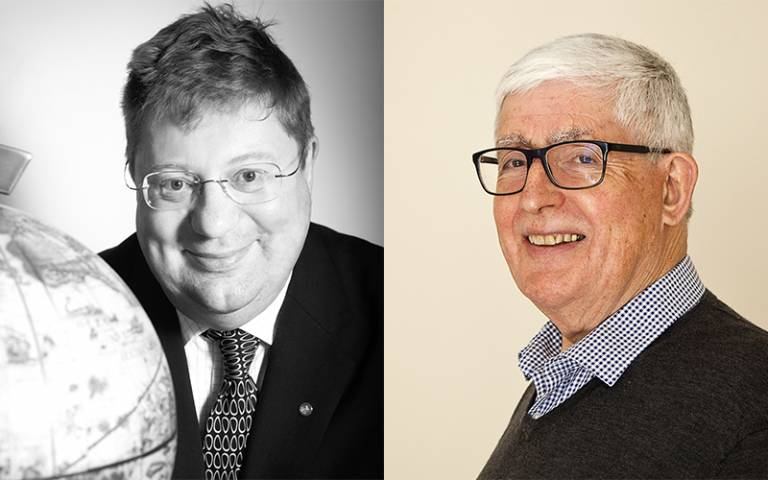Two UCL Professors elected new Fellows of the Royal Society
10 May 2021
Professor Hugh Griffiths (UCL Electronic & Electrical Engineering) and Professor Roger Lemon (UCL Queen Square Institute of Neurology) have been elected Fellows of the Royal Society.

They are among 63 scientists from the around the world who have newly joined the Royal Society as Fellows and Foreign Members in recognition of their exceptional contributions to science.
Professor Griffiths holds the THALES/Royal Academy Chair of RF Sensors in UCL’s department of Electronic & Electrical Engineering. He is a Fellow of the IET, IEEE and was elected to Fellowship of the Royal Academy of Engineering in 1997.
His research has been in the field of radar, including satellite-borne radar for geophysical remote sensing and for surveillance in defence and security, and particularly in bistatic radar, in which the transmitter and receiver are spatially separated. Most recently he has been working on commensal radar, which is based on communications, broadcast of radionavigation signals which are optimised both for their primary purpose and as radar signals. This will become increasingly important as the demand for spectrum from all users continues to grow.
Professor Griffiths said: “I am thrilled at this honour, which recognises the impact and importance of our work at UCL, and I am hugely grateful to all of the engineers and scientists who I have worked with and learned from over the years.”
Professor Lemon is Emeritus Sobell Professor of Neurophysiology at the UCL Queen Square Institute of Neurology and is a past Director of the Institute. The recent work carried out by his research group and their collaborators has been devoted to the cortical control of skilled hand movements in purpose-bred non-human primates. This has included the importance of vision in guiding the grasp of differently shaped objects and the use of tools to retrieve food rewards.
His group has also studied mirror neuron activity in the primate brain and the cortical mechanisms at play when one individual watches another perform a skilled grasp, understanding the processes that allow us to withhold our own movements when we observe another’s actions. The group has continued to use the knowledge gained from these studies to further our understanding of cortical control in humans, both in healthy volunteers as well as in patients suffering from neurodegenerative disorders such as ALS.
Professor Lemon commented, “I am surprised and delighted in equal measure with this election to FRS. Of course, it is really a recognition of all the research carried out with a great many gifted colleagues over a long period, and I am very grateful to all of them.”
Sir Adrian Smith, President of the Royal Society, said: “This is the first year of my presidency at the Royal Society and I’ve been very much looking forward to welcoming the newly elected Fellows and Foreign Members. The global pandemic has demonstrated the continuing importance of scientific thinking and collaboration across borders.
“Each Fellow and Foreign Member brings their area of scientific expertise to the Royal Society and when combined, this expertise supports the use of science for the benefit of humanity. Our new Fellows and Foreign Members are all at the forefronts of their fields from molecular genetics and cancer research to tropical open ecosystems and radar technology. It is an absolute pleasure and honour to have them join us.”
This year’s cohort consists of 52 Fellows, 10 Foreign Members and one Honorary Fellow, composed of the most distinguished scientists, technologists and engineers. Fellows are living and working in the UK and the Commonwealth, and Foreign Members are drawn from the rest of the world.
Links
- Professor Hugh Griffiths’ academic profile
- Professor Roger Lemon’s academic profile
- UCL Electronic & Electrical Engineering
- UCL Queen Square Institute of Neurology
- UCL Faculty of Engineering
- UCL Faculty of Brain Sciences
Image
- (l-r) Professor Hugh Griffiths and Professor Roger Lemon
Source
 Close
Close

